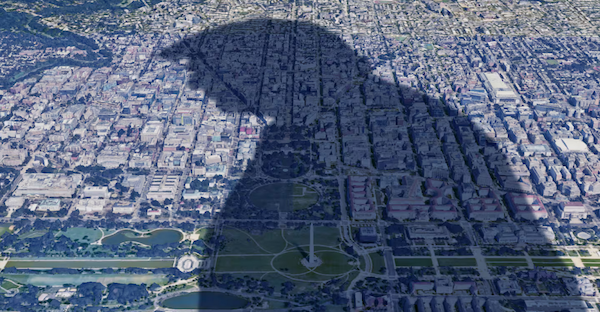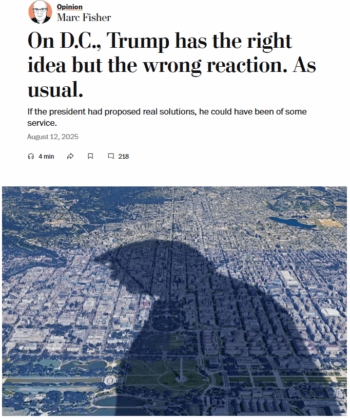
The Washington Post‘s Marc Fisher (8/12/25) envisions “a a scenario in which [Trump’s] dramatic takeover of the nation’s capital and his pronouncement that he will miraculously put an end to its crime might be greeted with more hope than skepticism or outrage.”
In addition to calling up 800 DC National Guard troops—which Trump can do because DC isn’t a state—he also seized control of DC’s police force in the name of a “crime emergency,” despite the city experiencing its lowest violent crime rate in 30 years.
With DC’s self-governance under threat, the city’s paper of record is positioned to play a critical role. Right off the bat, Washington Post columnist Marc Fisher sounded the alarm about Trump’s actions, telling the New Yorker (8/11/25),
This is troops-in-the-streets, shades-of-authoritarian-rule bad.
The next day, however, Fisher sounded like a different person in his Post column (8/12/25). Trump was transformed from authoritarian to astute-but-flawed leader; despite his “uncanny knack for identifying the problems that really bother voters,” Trump rarely translates that “into helpful solutions.” Regarding DC crime—Trump’s justification for his power grab—Fisher wrote that Trump
instinctively understands that the city feels unsafe, that the now-common sight of teens riding presumably stolen ATVs down DC’s grand avenues, popping wheelies and taunting motorists; the ubiquity of shoplifters…and the horror stories about violent carjackings—all this makes residents feel disrespected and unprotected.
‘A major problem’
In a matter of 24 hours, Fisher went from condemning Trump’s authoritarianism to almost welcoming it. The latter position puts him in good stead with fellow Washington Post columnists—who’ve been told to “communicate with optimism about this country” or take a generous buyout. (Unprecedented numbers have done the latter.)
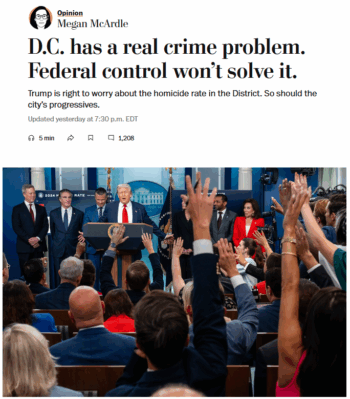
Megan McCardle (Washington Post, 8/12/25) said DC had “a massive 32% drop from the 273 people who were killed in 2023, but that probably wasn’t much comfort to those 187 people or their grieving families.”
“I’m afraid [Trump] is right that in DC, crime and disorder are a major problem,” Megan McArdle (8/12/25) wrote. “The problem isn’t as big as it was a few years ago, but with crime, as with cancer, ‘somewhat less of a problem than it was’ is not really very good news.” McArdle concluded with a lecture for activists:
Those who are opposed to Trump’s recent moves should argue not that they constitute incipient fascism, but that they aren’t a real solution.
Also weighing in was the Post editorial page, now headed by 33-year-old opinion editor Adam O’Neal, who has promised his section will be “unapologetically patriotic.”
“President Donald Trump is putting on quite the show,” read the opening of a Post editorial (8/11/25), which said Trump placing “armed troops on the streets of DC will probably have limited value.” So, some value.
The Post editorial seemed to provide Trump with precedent for militarizing DC, noting that while the U.S. has historically had “clear distinctions between the police and the military,” many European countries haven’t. (Not always for the better, as I recall).
Regarding Trump’s false claim of a DC crime wave, the Post equivocated, saying,
Whether a genuine emergency exists is up for debate.
This bothsidesism bled into the Post’s (8/13/25) reporting, which quoted Trump’s false attack on DC Mayor Muriel Bowser, then discounted her factual response about DC violent crime being at a 30-year low:
“She’s been here for many years and the numbers are worse than they ever were,”[Trump] said, dismissing data DC officials have been citing.
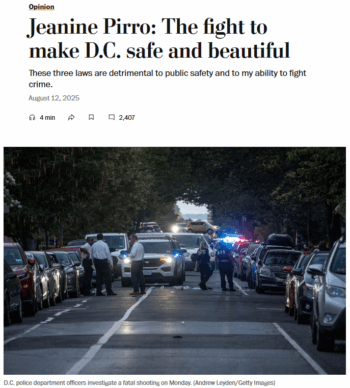
In a Washington Post op-ed (8/12/25), U.S. Attorney Jeanine Pirro said the need for tougher laws was demonstrated by the case of a defendant given probation under the Youth Rehabilitation Act after shooting someone (nonfatally) on a bus. Pirro linked to a news report that described the shooting victim as “harassing” the defendant on video “in the minutes before the shooting, as the defendant appeared to try avoiding confrontation.”
The Post’s August 11 editorial concluded by assuring District residents that Trump’s moves were just politics as usual:
However unpopular he might be in the deep-blue District, Trump is trying to deliver on the law-and-order message of his presidential campaign.
‘A mouthpiece for Trump’
On the heels of this editorial, O’Neal, the opinions editor, published and gave top billing to an op-ed (8/12/25) by Trump’s handpicked U.S. attorney for DC, former Fox News host Jeanine Pirro. In portraying DC as crime-infested, Pirro offered justification for Trump’s takeover.
“While not quite as incendiary as Tom Cotton’s infamous New York Times op-ed calling to ‘send in the troops,’ [Pirro’s op-ed’s] timing and framing were jarring for a paper that still claims ‘Democracy Dies in Darkness,’ wrote Status’s Oliver Darcy (8/13/25).
Under prior opinions chiefs, editorials like this wouldn’t have seen the light of day, according to a former Post opinion editor, who told Status,
They are turning the Post into a mouthpiece for the Trump administration.
The Post’s subtle support for Trump’s DC crime narrative even extended into the Letters to the Editor (8/12/25), which were published under the Trump-echoing headline “Making DC Safe Again.”
Departure from first term
The Washington Post’s acquiescence to Trump’s power grab is just the latest favor the president has received from the Jeff Bezos—owned paper (FAIR.org, 2/28/25). In addition to spiking the paper’s intended endorsement of Trump opponent Kamala Harris and showing up as a guest of honor at his second inauguration, Bezos and the company he founded, Amazon, have lavished tens of millions of dollars on Trump and his family. Meanwhile, Amazon and Bezos’s space company, Blue Origin, continue to rake in billions in federal contracts (Financial Times, 3/20/25).
The close partnership between Bezos and Trump marks a departure from Trump’s first term, when Bezos stood up to the president, as did his paper’s opinion page. When Trump put troops on DC’s streets in 2020 during the Black Lives Matter protests, a Washington Post editorial headline (6/2/20) read, “Trump’s Threats to Deploy Troops Move America Closer to Anarchy.”
The next day, the Post’s Philip Kennicott (6/3/20) noted how the Guard “looked like outsiders, like a colonial force” on DC’s streets. A Post op-ed (6/8/20) by Benjamin Haas and Kori Schake read:
The image of soldiers controlling America’s streets and engaging in law enforcement activity is evocative of the conduct of authoritarian countries from whom the United States takes pride in maintaining a distinction.
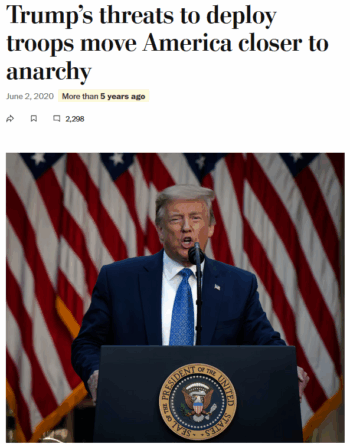
The Washington Post editorial board (6/2/20) had a very different tone when Trump sent National Guard troops to DC in 2020: “In enabling his incitement, Mr. Trump’s aides are helping him to push the country closer not to order but to anarchy.”
Trump’s justification for his “palace guard” was nothing more than “cynical hyperbole,” stated a Post editorial (6/2/20).
Also, back in 2020, Post columnist Colbert King (6/7/20) found the nature of Trump’s actions clear:
Trump’s views of African Americans match the spirit of Chief Justice Roger B. Taney’s observation in the 1857 Dred Scott decision that the black man “had no rights which the white man was bound to respect.”
A ‘federal coup’
What’s happening today is no less authoritarian or racist.
At his 80-minute news conference in the White House briefing room Monday, Trump claimed DC had become a hellscape “overtaken by violent gangs and bloodthirsty criminals, roving mobs of wild youth, drugged-out maniacs and homeless people.” And he told law enforcement to “do whatever the hell they want” with suspected wrongdoers in DC, even “knock the hell out of them, because it’s the only language they understand.”
In addition to DC, Trump singled out as crime-ridden the cities of “Baltimore, Chicago, Los Angeles, New York and Oakland—all of which have Black mayors and large minority populations that overwhelmingly voted against him in his three presidential runs,” Politico (8/12/25) reported.
Amid this backdrop, NAACP President Derrick Johnson (NBC News, 8/12/25) called what’s happening in DC a “federal coup.”
No such critique can be found in the Post, at least not this time around.

